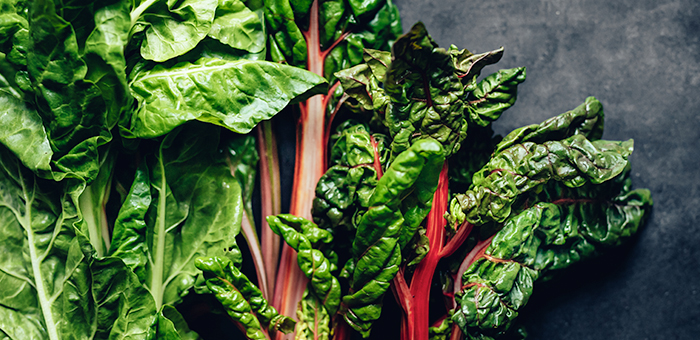Why to Go Green

Adequate vegetable consumption is one of the cornerstones of a healthy diet. Green leafy vegetables are often cited as being a cornerstone of a healthy diet. Here we’ll look at what benefits you’ll reap if you eat green.
In addition to being rich in nutrients such as calcium and magnesium green vegetables have some special constituents:
Antioxidants
Green vegetables in the brassicas family, such as broccoli, Brussels sprouts, cabbage and kale, contain high levels of antioxidants including glucosinolates, isothiocyanates and nitriles (1).
Carotenoids
Carotenoids are fat-soluble pigments that give some fruits and vegetables their bright colours. They are particularly abundant in yellow-orange fruits and dark green leafy vegetables. Carotenoids have antioxidant properties which protect cells and tissues from damage by free radicals. This enhances immune function, protects against sunburn and delays the onset of certain types of cancer (2). They are also the precursor to formation of vitamin A in the body.
Chlorophyll
Chlorophyll is the chemical by which plants photosynthesise sunlight into energy. It is largely chlorophyll that is responsible for the green pigmentation in plants. Luckily, even though we can’t make chlorophyll, we can benefit from the chlorophyll in plants by eating them.
The effects of chlorophyll on human health have been studied for almost 100 years. Over the past 30 years, the potential cancer preventative activities of chlorophyll have been the focus of much research. Effects of chlorophyll derivatives include prevention of cancer, slowing the progression of cancer and modulation of oxidative stress (3).
Vitamin K1
Green leafy vegetables and vegetable oils are the major dietary sources of vitamin K1 in humans. Also known as phylloquinone, vitamin K1 is a fat soluble vitamin that is required for blood clotting and bone health.
There is a huge amount of evidence showing the health-promoting properties of green foods. Here are some findings from recent research highlighting the benefits of eating green vegetables.
Green Veg for Mental Health
A high intake of fruits and vegetables, and some specific subgroups including green leafy vegetables, have a positive influence on mental health, may promote higher levels of optimism and self-efficacy, may reduce psychological distress, and may protect against depressive symptoms (4). Particularly of benefit to mental health in adolescents are green and yellow vegetables and fresh fruit (5).
Green Veg and Bone Health
High vegetable intake is associated with beneficial effects on bone. Green leafy vegetables are a rich source of vitamin K1, which is known to have significant effects on osteoblasts and osteocalcin metabolism. Eating 200g a day of green leafy vegetables rich in vitamin K1 substantially improves bone health (6).
Green Veg and Heart Health
Green leafy vegetables are particularly rich in cardioprotective nutrients. Eating 100g a day of leafy greens is associated with a with a lower incidence of cardiovascular diseases including coronary heart disease and stroke (7,8). Upping your green leafy veg intake may be a promising prevention strategy against cardiovascular events (9,10).
Green Veg and Cancer
Intake of green and yellow vegetables including cruciferous vegetables and salads reduces the risk of cancer (11). Green leafy veg is found to be specifically protective against bladder cancer, mouth cancer, oesophageal cancer, non-Hodgkin lymphoma and colon cancer (7,8,12). Research suggests green leafy vegetables may reduce the risk of red meat-induced colonic damage and colon cancer (13).
Green Veg and Eye Health
Green leafy vegetables are a rich source of lutein. Lutein intake is inversely associated with age-related macular degeneration and cataracts (7).
Green Veg and Gut Health
Brassicas heal stomach ulcers and inhibit gastric damage (14).
For help with increasing the amount of green veg in your diet and enhancing benefits you can derive from them see blog posts How to Go Green and Green Dreams Recipes for lots of ideas.
References
1. Mahn A, Reyes n overview of health-promoting compounds of broccoli (Brassica oleracea var. italica) and the effect of processing. Food Sci Tech Int. 2012 Dec;18(6):503-14.
2. Subcell Biochem. 2016;79:359-75. Carotenoids as a Source of Antioxidants in the Diet. Ana Augusta Odorissi Xavier, Antonio Perez-Galvez
3. Nutr Res. 2020 Sep;81:19-37. Update on the bioavailability and chemopreventative mechanisms of dietary chlorophyll derivatives. Hayes M, Ferruzzi M.
4. 2020 Jan 1;12(1):115. Fruit and Vegetable Intake and Mental Health in Adults: A Systematic Review. Glabska D et al.
5. Rocz Panstw Zakl Hig. 2020;71(1):15-25. Fruit and vegetables intake in adolescents and mental health: a systematic review. Glabska D et al.
6. Bone Rep. 2020 Apr 26;12:100274. The effects of vitamin K-rich green leafy vegetables on bone metabolism: A 4-week randomised controlled trial in middle-aged and older individuals. Sim M et al.
7. Food Chem. 2021 Oct 30;360:130145. Green leafy vegetable and lutein intake and multiple health outcomes. Ni Li et al.
8. Rev Prat. 2019 Feb;69(2):139-142. Fruit and vegetable consumption: what benefits, what risks? Amiot-Carlin MJ
9. Cardiovasc J Afr. 2021 Jul-Aug 23;32(4):215-223. Dietary intakes of green leafy vegetables and incidence of cardiovascular diseases. Ojagbemi A et al.
10. 2018 May 11;10(5):595. Cardiovascular Health Benefits of Specific Vegetable Types: A Narrative Review. Blekkenhorst LC et al.
11. Int J Epidemiol. 2017 Jun 1;46(3):1029-1056. Fruit and vegetable intake and the risk of cardiovascular disease, total cancer and all-cause mortality-a systematic review and dose-response meta-analysis of prospective studies. Aune D et al.
12. 2019 Oct 2;11(10):2349. Primary Outcomes of a Randomized Controlled Crossover Trial to Explore the Effects of a High Chlorophyll Dietary Intervention to Reduce Colon Cancer Risk in Adults: The Meat and Three Greens (M3G) Feasibility Trial. Fruge AD et al.
13. 2021 Apr 7;13(4):1220. A Dietary Intervention High in Green Leafy Vegetables Reduces Oxidative DNA Damage in Adults at Increased Risk of Colorectal Cancer: Biological Outcomes of the Randomized Controlled Meat and Three Greens (M3G) Feasibility Trial. Fruge AD et al.
14. Carvalho CA, Fernandes KM, Matta SL, Silva MB, Oliveira LL, Fonseca CC. Evaluation of antiulcerogenic activity of aqueous extract of Brassica oleracea var. capitata (cabbage) on Wistar rat gastric ulceration. Arg Gastroenterol. 2011 Oct-Dec;48(4):276-82.